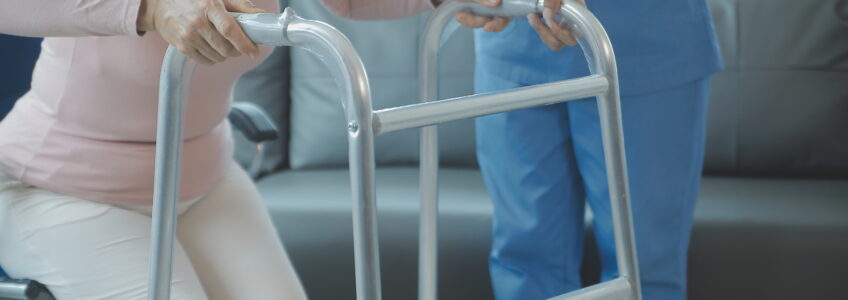
Aging seniors often face significant challenges following surgery or major medical emergencies. The recovery process can be long and arduous, requiring medical care and support to regain independence and improve quality of life. This is where occupational therapy (OT) comes into play.
Understanding what occupational therapy is and why it is crucial for seniors, especially when provided in the home, can help families make informed decisions about their loved one’s care.
What Is Occupational Therapy?
Occupational therapy is a holistic approach to health care that focuses on enabling individuals to participate in everyday activities or “occupations” that are meaningful to them.
These activities can range from basic self-care tasks, such as bathing and dressing, to more complex activities, like cooking, gardening, or engaging in social interactions. For seniors, occupational therapy aims to improve their ability to perform daily activities safely and independently, thereby enhancing their quality of life.
The Role of Occupational Therapy for Aging Seniors
Following surgery or a major medical emergency, seniors often experience a decline in physical, cognitive, and emotional functioning. This decline can significantly impact their ability to live independently. Occupational therapy addresses these issues through a personalized care plan that targets the individual’s specific needs and goals.
1. Physical Rehabilitation
Occupational therapists (OTs) help seniors regain strength, coordination, and mobility. After a surgical procedure or a medical emergency such as a stroke, seniors may struggle with physical limitations.
OTs design exercises and activities to improve muscle strength, enhance coordination, and increase range of motion. This physical rehabilitation is crucial in preventing complications such as muscle atrophy and joint stiffness, promoting quicker and more effective recovery.
2. Enhancing Cognitive Function
Cognitive impairments, such as memory loss and decreased problem-solving abilities, can occur following major medical events. Occupational therapists work with seniors to improve cognitive function through targeted activities that stimulate brain function.
This can include memory exercises, puzzles, and other cognitive tasks designed to enhance mental agility. Improving cognitive function helps seniors maintain independence and reduces the risk of accidents related to confusion or forgetfulness.
3. Emotional Support and Adaptation
The emotional impact of surgery or a major medical emergency can be profound. Seniors may experience anxiety, depression, or a loss of confidence. Occupational therapy addresses these emotional challenges by providing support and helping seniors adapt to their new circumstances.
Therapists assist in setting achievable goals, building self-esteem, and encouraging participation in activities that bring joy and satisfaction. This emotional support is vital in fostering a positive outlook and promoting mental well-being.
The Importance of In-Home Occupational Therapy
For aging seniors, receiving occupational therapy in the comfort of their own homes can be particularly beneficial. Here’s why in-home OT is so important:
1. Familiar Environment
The home environment is familiar and comforting, which can significantly enhance the effectiveness of occupational therapy. Seniors are more likely to engage and cooperate with therapy when they are in a space where they feel safe and secure. This comfort level can lead to better outcomes and a smoother recovery process.
2. Personalized Care
In-home occupational therapy allows for highly personalized care tailored to the specific needs and living situation of the senior. Therapists can directly assess and modify the home environment to make it safer and more accessible. This might include recommending adaptive equipment, reorganizing furniture for better mobility, or suggesting home modifications like grab bars and ramps.
3. Convenience and Accessibility
Traveling to outpatient therapy appointments can be challenging for seniors, particularly those with mobility issues or those recovering from surgery. In-home occupational therapy eliminates the need for travel, making it easier for seniors to receive consistent and uninterrupted care.
This convenience ensures that therapy sessions are more regular and that seniors do not miss out on essential rehabilitation due to transportation difficulties.
4. Family Involvement
In-home therapy sessions allow family members to be more involved in the care process. Family caregivers can observe and learn techniques and strategies from the occupational therapist, enabling them to provide better support between sessions.
This involvement fosters a collaborative approach to care, improving the overall support system for the senior.
5. Holistic Approach
Occupational therapists consider the senior’s entire living environment and daily routine, providing a holistic approach to care. They help seniors integrate therapeutic activities into their daily lives, making the therapy more relevant and sustainable.
This holistic approach ensures that therapy’s benefits extend beyond the sessions and into the senior’s everyday life.
Occupational therapy is a vital component of recovery for aging seniors following surgery or major medical emergencies. It addresses physical, cognitive, and emotional challenges, helping seniors regain independence and improve their quality of life. In-home occupational therapy offers personalized, convenient, and effective care tailored to each senior’s unique needs.
By bringing therapy into the comfort of their own home, seniors can experience a smoother and more supported recovery journey, enhancing their overall well-being and promoting a more independent and fulfilling life.
If you or someone you know needs Occupational Therapy in Mankato, MN, contact Adara Home Health. We provide quality and affordable home care services for many fragile or senior members in the communities we serve. Call us at (888) 525-7742 for more information.

